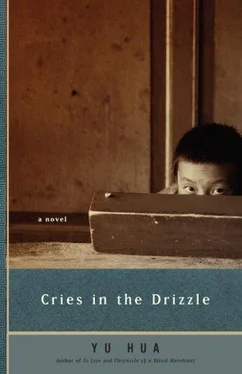It did not take me long to realize that Su Yu found me intriguing. Often he would raise his head and look at me as I walked, silent and alone, along the other side of the street, while our classmates marched up the middle in groups of four or five, talking at the top of their voices. But Su Yu's carefree life in South-gate had left a deep impression, discouraging me from trying to forge any ties with him. Besides, the fact that I had no friends made it difficult for me to imagine that a boy two grades above me would come forward and greet me so cordially.
It was not until the term was about to end that Su Yu suddenly spoke up. We were walking down either side of the street, and when I looked over at Su Yu he surprised me by coming to a stop and smiling at me. Then — a moment I will never forget — he blushed with embarrassment. This self-conscious boy so soon to become my friend, called out “Sun Guanglin.”
I just stood there. I can no longer retrieve my precise emotions at that moment, but I know that I looked at him intently. Bunches of schoolchildren were walking along between us, and only when a gap appeared did Su Yu walk across and ask, “Do you remember me?”
When I first approached Su Hang, what I had been hoping was precisely that he would say something like this, but in the end I heard these words from his brother instead. Tears nearly came to my eyes as I nodded and said, “You're Su Yu.”
After this exchange, if we happened to run into each other at the end of the school day it seemed natural to stay together. Often I would see Su Hang not too far away, watching us with a bemused expression. After a while we did not feel ready to head off in different directions when we reached the school gate, and Su Yu began to walk me partway home, as far as the wooden bridge that led to Southgate. He would stand there and wave to me after I crossed to the other side, then turn around and disappear into the distance.
A few years ago, when I made a return visit to Southgate, the old wooden bridge had been replaced by a new concrete structure. I stood in the winter twilight, recalling things that happened that summer. My nostalgic gaze gradually obliterated the factory, the now-bricked-over riverbank, and the concrete bridge I stood upon. I saw once again Southgate s fields and the muddy bank covered with green. The concrete slabs beneath my feet turned back into the wooden boards of earlier days, and through the slits between the boards I watched the river flow.
In the chill winter wind I remembered the following scene. Late one summer afternoon Su Yu and I stood on the bridge together for a long time, and as he gazed sheepishly toward South-gate his eyes reddened in the sunset. In a tone as serene as the dusk itself, he spoke of a tranquil moment during his time there. It had been so hot one night that he couldn't bear to let down his mosquito net, so his mother sat by his bedside, fanning him and driving away mosquitoes; only after he had fallen asleep did she close the net around him.
When Su Yu first told me about this incident, I felt a pang, for by then it was almost unthinkable that I would receive any affection from my family.
Su Yu had had a nightmare later. “I seemed to have killed someone. The police were looking for me everywhere, so I ran back to the house to hide. But when my parents came home from work and found me, they took a rope and tied me to the tree in front of the house so that the police could come and take me away. I cried and cried, begging them not to do that. But they just kept cursing and cursing.”
Su Yu's wails woke up his mother. When she roused him from his dream, he was in a cold sweat and his heart was pounding. “What on earth are you crying about?” she scolded. “Are you out of your mind?”
The contempt in his mother's voice plunged Su Yu into despondency.
When the young Su Yu told this story to the younger me, probably neither of us could make much sense of it. More than ten years after Su Yu's death, as I stood alone with my memories on the bridge to Southgate, it dawned on me that Su Yu, such a sensitive soul, must always have oscillated between happiness and despair.
SHIVERS
When I was fourteen, under cover of darkness I discovered a mysterious activity that gave me a wonderful sensation. At the moment of climax, rapture arrived on the coattails of apprehension. After this, when I encountered the word shiver , I understood it in a sense different from the purely negative connotation ascribed to it by my peers, and perhaps more akin to what Goethe intended when he wrote, “To shiver is mankind's finest lot.”
During those long evenings when I first scaled the thrilling heights, only to enter a world of utter emptiness and discover a wet patch on my underpants, I could not help but feel anxious and bewildered. My initial sense of alarm did not trigger guilt as much as a fear that I had fallen prey to some physiological disorder. At first I assumed the moisture was caused by an escape of urine, and what embarrassed me, in my ignorance, was not the shamefulness of my action but rather the idea that at my age I might still wet my bed. At the same time I was in a panic because I wondered if I might be ill. Nonetheless, such was my craving for this momentary wave of pleasure that I couldn't stop myself from repeatedly undertaking the maneuvers that would culminate in that ecstatic shudder.
When I left the house after lunch one day, the summer I was fourteen, and walked toward the school in town, my face went pale under the dazzling sun, for at this very hour I was intending to perform the disgraceful deed in order to solve the mystery of my nocturnal emissions. Given my age at the time, I was no longer able to let everything happen in accordance with what were held to be correct principles, and my inner desires began silently to control some of my words and actions. For days now, I had been dying to know exactly what had been discharged. At home, I couldn't carry out my scheme, and my only recourse was to pay a visit to the school toilets at lunchtime, when nobody else would be there. Later on the memory of those ramshackle toilets made me cringe, and for a long time I couldn't help but despise myself for choosing the most sordid venue in which to engage in the most sordid activity. Now I refuse to indulge in that kind of self-reproach, because my opting for the toilets simply reflected the fact that in my youth I had no place to hide. My choice was forced on me by circumstances.
I prefer not to describe the grim ambience of the school toilets; just to recall the buzzing of flies and the din of cicadas in the trees outside is enough to make me tense. I remember that after leaving the toilets I felt completely drained as I walked across the sun-bleached playground. With my most recent discovery confusion had given way to bafflement. When I walked into the classroom opposite I was thinking I might lie down in the empty room, but to my alarm I saw a girl doing her homework there, and her serene expression instantly drove home to me the weight of my sin. I dared not enter the classroom, but stood miserably next to a window in the hallway. I had no idea what I should do next and felt as though the day of judgment was nigh. When an old cleaning woman went into the toilet I had just vacated, bucket in hand, I began to tremble.
Later I grew more accustomed to the sensation, and when darkness fell I was no longer so fearful of sinning. It had become apparent to me that self-reproach was ineffectual in the face of temptation, and night always accorded leniency and consolation. As I wearily drifted off to sleep, the sight that often met my eyes was a brightly colored jacket fluttering gently in a light gray sky, and the austere soul that had been wont to put me on trial disappeared in the distance.
Читать дальше












